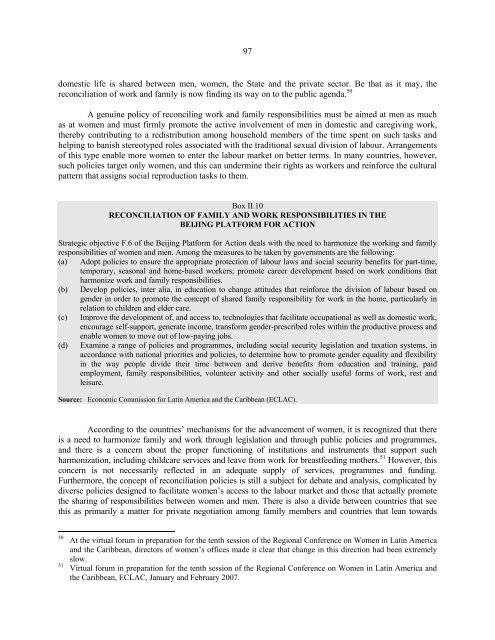Women in Latin America and the Caribbean - Cepal
Women in Latin America and the Caribbean - Cepal
Women in Latin America and the Caribbean - Cepal
Create successful ePaper yourself
Turn your PDF publications into a flip-book with our unique Google optimized e-Paper software.
97<br />
domestic life is shared between men, women, <strong>the</strong> State <strong>and</strong> <strong>the</strong> private sector. Be that as it may, <strong>the</strong><br />
reconciliation of work <strong>and</strong> family is now f<strong>in</strong>d<strong>in</strong>g its way on to <strong>the</strong> public agenda. 50<br />
A genu<strong>in</strong>e policy of reconcil<strong>in</strong>g work <strong>and</strong> family responsibilities must be aimed at men as much<br />
as at women <strong>and</strong> must firmly promote <strong>the</strong> active <strong>in</strong>volvement of men <strong>in</strong> domestic <strong>and</strong> caregiv<strong>in</strong>g work,<br />
<strong>the</strong>reby contribut<strong>in</strong>g to a redistribution among household members of <strong>the</strong> time spent on such tasks <strong>and</strong><br />
help<strong>in</strong>g to banish stereotyped roles associated with <strong>the</strong> traditional sexual division of labour. Arrangements<br />
of this type enable more women to enter <strong>the</strong> labour market on better terms. In many countries, however,<br />
such policies target only women, <strong>and</strong> this can underm<strong>in</strong>e <strong>the</strong>ir rights as workers <strong>and</strong> re<strong>in</strong>force <strong>the</strong> cultural<br />
pattern that assigns social reproduction tasks to <strong>the</strong>m.<br />
Box II.10<br />
RECONCILIATION OF FAMILY AND WORK RESPONSIBILITIES IN THE<br />
BEIJING PLATFORM FOR ACTION<br />
Strategic objective F.6 of <strong>the</strong> Beij<strong>in</strong>g Platform for Action deals with <strong>the</strong> need to harmonize <strong>the</strong> work<strong>in</strong>g <strong>and</strong> family<br />
responsibilities of women <strong>and</strong> men. Among <strong>the</strong> measures to be taken by governments are <strong>the</strong> follow<strong>in</strong>g:<br />
(a) Adopt policies to ensure <strong>the</strong> appropriate protection of labour laws <strong>and</strong> social security benefits for part-time,<br />
temporary, seasonal <strong>and</strong> home-based workers; promote career development based on work conditions that<br />
harmonize work <strong>and</strong> family responsibilities.<br />
(b) Develop policies, <strong>in</strong>ter alia, <strong>in</strong> education to change attitudes that re<strong>in</strong>force <strong>the</strong> division of labour based on<br />
gender <strong>in</strong> order to promote <strong>the</strong> concept of shared family responsibility for work <strong>in</strong> <strong>the</strong> home, particularly <strong>in</strong><br />
relation to children <strong>and</strong> elder care.<br />
(c) Improve <strong>the</strong> development of, <strong>and</strong> access to, technologies that facilitate occupational as well as domestic work,<br />
encourage self-support, generate <strong>in</strong>come, transform gender-prescribed roles with<strong>in</strong> <strong>the</strong> productive process <strong>and</strong><br />
enable women to move out of low-pay<strong>in</strong>g jobs.<br />
(d) Exam<strong>in</strong>e a range of policies <strong>and</strong> programmes, <strong>in</strong>clud<strong>in</strong>g social security legislation <strong>and</strong> taxation systems, <strong>in</strong><br />
accordance with national priorities <strong>and</strong> policies, to determ<strong>in</strong>e how to promote gender equality <strong>and</strong> flexibility<br />
<strong>in</strong> <strong>the</strong> way people divide <strong>the</strong>ir time between <strong>and</strong> derive benefits from education <strong>and</strong> tra<strong>in</strong><strong>in</strong>g, paid<br />
employment, family responsibilities, volunteer activity <strong>and</strong> o<strong>the</strong>r socially useful forms of work, rest <strong>and</strong><br />
leisure.<br />
Source: Economic Commission for Lat<strong>in</strong> <strong>America</strong> <strong>and</strong> <strong>the</strong> <strong>Caribbean</strong> (ECLAC).<br />
Accord<strong>in</strong>g to <strong>the</strong> countries’ mechanisms for <strong>the</strong> advancement of women, it is recognized that <strong>the</strong>re<br />
is a need to harmonize family <strong>and</strong> work through legislation <strong>and</strong> through public policies <strong>and</strong> programmes,<br />
<strong>and</strong> <strong>the</strong>re is a concern about <strong>the</strong> proper function<strong>in</strong>g of <strong>in</strong>stitutions <strong>and</strong> <strong>in</strong>struments that support such<br />
harmonization, <strong>in</strong>clud<strong>in</strong>g childcare services <strong>and</strong> leave from work for breastfeed<strong>in</strong>g mo<strong>the</strong>rs. 51 However, this<br />
concern is not necessarily reflected <strong>in</strong> an adequate supply of services, programmes <strong>and</strong> fund<strong>in</strong>g.<br />
Fur<strong>the</strong>rmore, <strong>the</strong> concept of reconciliation policies is still a subject for debate <strong>and</strong> analysis, complicated by<br />
diverse policies designed to facilitate women’s access to <strong>the</strong> labour market <strong>and</strong> those that actually promote<br />
<strong>the</strong> shar<strong>in</strong>g of responsibilities between women <strong>and</strong> men. There is also a divide between countries that see<br />
this as primarily a matter for private negotiation among family members <strong>and</strong> countries that lean towards<br />
50<br />
51<br />
At <strong>the</strong> virtual forum <strong>in</strong> preparation for <strong>the</strong> tenth session of <strong>the</strong> Regional Conference on <strong>Women</strong> <strong>in</strong> Lat<strong>in</strong> <strong>America</strong><br />
<strong>and</strong> <strong>the</strong> <strong>Caribbean</strong>, directors of women’s offices made it clear that change <strong>in</strong> this direction had been extremely<br />
slow.<br />
Virtual forum <strong>in</strong> preparation for <strong>the</strong> tenth session of <strong>the</strong> Regional Conference on <strong>Women</strong> <strong>in</strong> Lat<strong>in</strong> <strong>America</strong> <strong>and</strong><br />
<strong>the</strong> <strong>Caribbean</strong>, ECLAC, January <strong>and</strong> February 2007.











